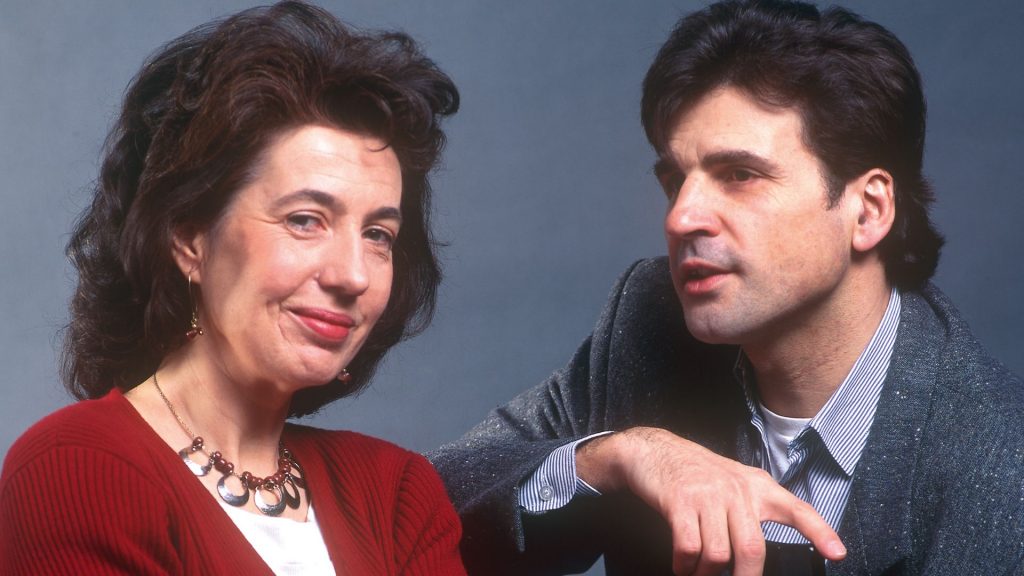On the occasion of Wolfgang Holzmair’s 70th birthday, Imogen Cooper pays tribute to the man and musician.

It is close on 30 years since Wolfgang and I rehearsed for our first concert. It was in a little church in Steinbach, on the Attersee in the Austrian Salzkammergut. We were to perform the Schubert Schwanengesang and had put aside a couple of days to prepare. At Wolfgang’s request, we went right through the cycle without stopping, this at our very first encounter. It was effortless. How miraculous that a singer from Upper Austria and a pianist from North London could be in such harmony from the start! Wolfgang just suggested that we try a different tempo for “Der Taubenpost” but little else.
That set the pattern for our rehearsing in the next couple of decades. Rare that major musical points needed to be discussed – more, details around the text, which for him is the starting point in the interpretation of any and every song. He would say before going onstage ‘Erzähl’ die Geschichte!’ – ‘Tell the story!’. I say it to myself still now, also when I am playing solo . All music-making is about telling the story and sharing the narrative, articulated even without words. I understood that first through playing Lieder, and above all playing with Wolfgang.
We performed regularly and made many recordings for Philips. These would mostly happen in Austria, and they were exciting, if tense, times for both of us: for Wolfgang because of the strain on voice and nerves of multiple takes, and for me because on top of the repetition needed for the process of recording, I was also allotted most of the listening back in the control room, there being an understandable limit to the amount that a singer can listen to the sound of his own voice without paralyzing self-consciousness seeping in. It was a tough job taking decisions together with our producer.
We were frequently in wonderful venues – the baroque Mozarteum in Salzburg, the Otto Wagner Psychiatrisches Krankenhaus on the Baumgartnerhöhe in Vienna (pure Jugendstil down to the last coat-hook), the Haydnsaal in Schloss Eisenstadt where many Haydn first performances had taken place. In this last, we encountered the challenge of wine-making going on in the basement, just under the hall, making it impossible to record without extraneous noises. For all that the recording team and I were keen to preserve Wolfgang’s calm – he could be thunderous at times – we were defeated by our linguistic credentials being primarily English and Dutch. Wolfgang was the first to realise that this would not go far with local winemakers. With jaw clenched in annoyance, he departed to the basement. To this day, we don’t know what was said or in what tone it was conveyed – or what dialect; he is an Upper Austrian and we were in Burgenland – but there followed total silence. We could and did proceed.
He never ever compromised, either recording or performing. He gave of his all, whatever it cost him. And his all was profound. He dug deep to convey every aspect of the text, and his voice was unfailingly expressive, with this extraordinary silver colour in the high voice – quite unique. But he knew how to convey darkness too, and irony – listen to his Mahler! – like few other singers. His platform presence was involving from the moment he came onstage, but not without some conflict, between good looks and a certain tension, which to me was simply the reverse side of the medal of intensity, which no music-making should be without. There was huge emotion involved, and it was not for all mortals who wanted their Lieder simple and soothing. For those who knew better it was unforgettable.
In rehearsal we touched on the most extreme emotions. I remember us preparing the Schumann Kerner-Lieder, both as it happened with a layer of skin too few in those few days, for various reasons. I had just lost my mother and was still both cauterized and in wonder at having been present at her death. This, of all the sets of Schumann songs, took us to an area of emotion in which it was not possible to stay calm for long. Those December rehearsals, in his small studio in Vienna, were marked by both of us being completely overwhelmed, and trying to hide it from the other so as to be able to keep working.
But we were also prone to uncontrollable giggles. I do not remember there ever being a clear reason – maybe it was self-defence against excess emotion. I confess that I was the culprit mostly in starting these fits, but it was hugely infectious and for all that Wolfgang attempted to keep going, he picked it up immediately and we were soon holding our sides with tears rolling down our faces. No explanation was ever given, nor was it necessary. Somehow these moments were very dear to us.
My twenty or so years of making music with him, where our musical relationship was without complication, remain among the most precious experiences of my working life. I wish you, Wolfgang, the happiest next decade and beyond!
WOLFGANG HOLZMAIR – COMPLETE PHILIPS RECITALS IS RELEASED 11 MARCH 2022
